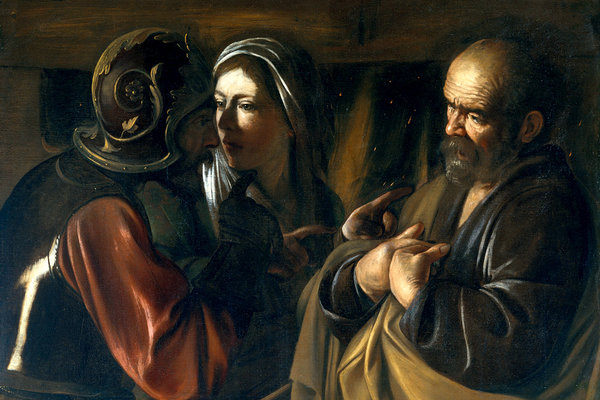54 Then they seized him and led him away, bringing him into the high priest’s house. But Peter was following at a distance. 55 When they had kindled a fire in the middle of the courtyard and sat down together, Peter sat among them.56 Then a servant-girl, seeing him in the firelight, stared at him and said, “This man also was with him.” 57 But he denied it, saying, “Woman, I do not know him.” [Luke 22:54-57, NRSV]
[L] The Denial of Saint Peter, by Caravaggio, 1610. [R] The Denial of St Peter, by Gerard van Honthorst, 1622.
For a period of three years, Jesus’ public ministry drew great crowds of admirers. But he also attracted serious antipathy from the scribes, Pharisees and priests, culminating eventually in his capture, trials and crucifixion.
Peter was one of the twelve disciples whom Jesus gathered as close associates. His three denials of knowledge of and association with Jesus were made in the face of accusations that he was “with Jesus”, the term indicating the bond of discipleship.
The Gospel of Matthew states that Peter denied Jesus “in front of everyone“, thus turning him into a counter-witness in public. But public witness, we must know, is an essential key to the understanding of Christian discipleship in the Matthean theology. The Evangelist stresses its importance by quoting directly from the Lord in 10:32-33:
- “Whoever acknowledges me before men, I will also acknowledge him before my Father in heaven. But whoever disowns me before men, I will disown him before my Father in heaven.”
Peter’s denial, which is in direct conflict with the nature of discipleship, is heightened by a drama of descent towards increasing darkness, until that horrible descent is halted by the hint of dawn, and thus the promise of light, from the cock crow. Just as Peter’s accusers progress from a maid, to a maid plus a bystander, to a whole crowd, his denial progresses from a plea of ignorance, to a denial plus an oath, and then to cursing and swearing with a total denial that he ever knew “this man” Jesus.
The sound of the rooster shocks Peter to his senses, signifying his stunned realization that Jesus had predicted the three denials. He is not the man he wanted to be (“I will die with you, Lord,” he had declared to Jesus); he is not the man he was meant to be (“I will make you fisher of men,” Jesus had declared to him). Thereupon, Peter goes out and weeps bitterly.
Already, we notice a crucial difference between Peter and Judas. Unable to see and trust the forgiveness by the God of mercy, Judas went out and hung himself. Judas, who sold the Lord, repented alright, yet he could not “come back” because he could not see the light. He trusted the magnitude of his own sin and darkness more than he trusted the merciful heart and light of Christ. Peter, too, denied the Lord, but his story ended entirely differently. Peter saw and trusted the light, repented, and came back with buckets of tears to begin a new day in the Lord. Well, Peter’s journey away and back to the Lord is of no consequence to anyone who thinks themselves sinless, but to the rest of us who acknowledge that we are sinners, Peter’s fall and rise again is most encouraging.
Following the resurrection of Jesus, the Gospel of John 21:15-17 narrates how Christ asked Peter three times if Peter loved him. Though it was painful for Peter to undergo such scrutiny by Christ, apparently the Lord deemed the process necessary for the rehabilitation of Peter following his repentance. Peter’s denial is recorded in all the four Gospels, three of which also recorded his bitter tears of remorse after that.
Saint Peter is so lovable because he mirrors so well our very human aspirations, gifts, and failings. Peter’s whole story applies well to business leaders of all stripes, but the ethical depth dimension bears special application to Christian business leaders. A short list of markers may help pin down the points of significance Christian business leaders can take away from an engaging reflection on his story:
- Business leaders have fears and confusions similar to Peter when the going gets tough. They are sometimes at a loss to know the right thing to do, particularly when they hit a difficult patch and need to act. To act (again) with moral compass, Peter’s story points to a bridge that takes them back to Christ. They, too, can find or recover their moral compass the same way Peter did by remembering, weeping and repenting where that’s called for, and then going back to work.
- Business leaders give credit to Peter who “hang in there” when things look bleak. Peter was probably scared half to death. But Peter was there. The others had fled. Loyalty does not mean “without fear”. A hero is not someone who does not know fear, but is someone who, though fearful of the situation, goes on to do what is right. The only disciple at the courtyard, Peter put himself at great risks. It was a very tough situation indeed; still, he must have felt terrible denying even knowing Jesus. Righteous people who were not there may be quick to make snide remarks about this “spineless” Peter. But Peter was there. He did not leave. He was just an ordinary (business) man in a very rough spot right now and was just trying to get through the night to see how things would develop. He did not come out looking very good. But, he was there. He hung in there, hoping against hope that something good might still come out of this.
- Like Peter, business leaders try not to surrender their moral compass to the simple expedience of the business rationale. Others in the same “business” with Peter had rationalsed in advance that it was a “no win” situation. Having concluded that it was all futile, for they were in no position to change things, they abandoned Jesus and fled. This kind of rationalization is too familiar. It is human to try to rationalise in order to get out of becoming involved in a mess. The result is, Jesus and all that he stands for gets left behind, abandoned by avowed followers who became indistinguishable from “the crowds” who come for a good show, some good stuff and fanfare.
- It is quite alright for business leaders, realising that they came up short, to weep bitterly as Peter did. He let Jesus down and he felt crushing shame. Peter had a good memory: he remembered with gratitude what Jesus had done for him and he wanted to try and do right by Jesus. Peter knew that if his denials of the Lord had marked the end of his work as a follower of Christ and leader of Christ’s community, he would have been an abject failure. However, Peter’s story does not stop there. He returned to the community of Jesus’ disciples. He returned to the community as its acknowledged leader, experienced Jesus after the resurrection, thrice told by the Lord to feed his lambs and his sheep, was present at the Lord’s final leave-taking and, very importantly, returning again to the Upper Room, just as the Lord had promised would happen, received the Holy Spirit. The Pentecost event blasted him out of his fearful hiding and into the public square to proclaim the Gospel to the whole world, including the world of “business as usual”.
- A glorious day awaits all business leaders who have faltered to accept that Jesus did not give up on Peter who faltered big time. Rather, Jesus kept after Peter, asking him to affirm his love and commitment as he charged him to care for his flock. Peter, who has repented and wept, found his moral compass again and went back to work with new found courage and vitality. He returned to lead his community – his “business organization”. He continued his close personal engagement with the risen Christ. Peter has experienced what Marilyn vos Savant articulates: “Being defeated is only a temporary condition; giving up is what makes it permanent.” Peter was not defined by endless regrets over what he did. What was important for him was that he did not want to regret for the rest of his life the things he did not do when he had a second chance. As he learned to move on, the striking point about Peter is that, when push came to shove, the values of the Lord, his community, and the people he loved helped guide his leadership.
The foundation for this sustaining, nurturing, instructing, and challenging love is found in the love and confidence Christ has in each of us and in the hope and the gratitude that erupts in us from our realization and acceptance of Christ’s love. St. Paul captured this in his letter to the Romans when he wrote:
- And this hope will not leave us disappointed, because the love of God has been poured out in our hearts though the Holy Spirit, who has been given to us. (Romans 5:5)
In the business world, the common experience both spoken and unspoken is that daily business men and women break both the divine laws and the secular laws. In other words, as Christians, business leaders lament that they deny Jesus in failing to stand up for his ethical values. As Christians, they bear his name, and yet they sell him short. Like Saint Peter, they may need to look at Jesus, and let Jesus look at them, to expose any layer of silver that blocks their moral compass.
In his address to the Christian Union of Italian Business Executives on 2 November 2015, Pope Francis exhorted all business men and women to “not fail to act with competence, honesty and a sense of responsibility. The economy and business are in need of ethics for their correct functioning; not any sort of ethics, but rather an ethic that puts the person and the community at the center.”
Copyright © Dr. Jeffrey & Angie Goh, February 2016. All rights reserved.
You are most welcome to respond to this post. Email your comments to jeffangiegoh@gmail.com. You can also be dialogue partners in this Ephphatha Coffee-Corner Ministry by sending us questions for discussion.


